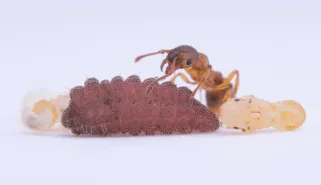Tapping into an ancient cellular energy source may help stave off the rigors of surgery and the ravages of age.
Hydrogen sulfide, a foul-smelling poisonous gas that microbes have been munching for eons, may be responsible for the health benefits and life-extending effects of reduced-calorie diets, scientists propose December 23 in Cell. Caloric restriction is a proven method for lengthening life span of a wide variety of organisms, but scientists still don’t know exactly how it works. The new work, by James Mitchell at the Harvard School of Public Health and colleagues, suggests that holding back calories causes cells to produce hydrogen sulfide, which somehow makes tissues more resilient and prolongs the life of laboratory organisms.
The finding provides a central theory that may help researchers make sense of disparate results from previous caloric restriction studies, says Siegfried Hekimi, a geneticist at McGill University in Montreal. “It’s the sort of paper you read and you’re jealous you didn’t do that work.”
Caloric restriction, sometimes called dietary restriction, may really work through cutting protein, specifically the sulfur-containing amino acids found in many proteins, say Mitchell, a biochemist and geneticist, and his colleagues.
Cutting protein in mice’s diets increased the production of hydrogen sulfide in their livers, the researchers discovered. Hydrogen sulfide can be deadly in high doses. But at the low levels inside the body, the gas seemed to prevent liver damage from surgery that temporarily cut off blood flow to the organ in mice.
To Mitchell, that suggests that fasting before surgery might help people recover better, but stresses that he has no data to back up that idea yet.
In another experiment, the researchers fed mice a protein-deficient diet but replaced the lost protein calories with those from carbohydrates. The no-protein mice staved off liver damage just as well as calorie-restricted mice did. That finding indicates that proteins, not calories, are the important component of the diet. Other researchers have previously demonstrated that cutting protein may be at least as important as cutting calories (SN: 4/5/14, p. 6). Mitchell’s group took another step toward explaining why reducing proteins is beneficial.
When the researchers added two sulfur-containing amino acids, methionine and cysteine, to the mice’s protein-poor diets, the liver protection mostly disappeared. That result suggests that caloric restriction works by eliminating the sulfur provided by the two amino acids. Cutting those amino acids increases cells’ hydrogen sulfide production.
Cutting calories from the diets of mice, fruit flies, nematode worms and yeast led all of the organisms to produce more hydrogen sulfide, Mitchell and colleagues found. Worms that made more hydrogen sulfide lived longer, on average, than those that made the normal amount of the gas. Caloric restriction can nearly double a worm’s life span, but when the nematodes can’t make hydrogen sulfide their life span extension isn’t nearly as dramatic, Mitchell’s group discovered. Those results indicate that hydrogen sulfide is partially responsible for fighting aging in calorie-restricted organisms.
Hekimi says the work clears up confusion about the role of oxidants and antioxidants in caloric restriction: They aren’t involved, Mitchell’s studies demonstrate. Researchers had thought that caloric restriction either reduced the amount of oxygen radicals —hyperreactive molecules that can damage cellular components — or, instead slightly increased their levels. The evidence that oxygen radicals were beneficial came from experiments in which researchers gave animals an antioxidant called N-acetyl cysteine. The compound blocked the healthful effects of caloric restriction. But the new study shows that the compound erased caloric restriction’s benefits not because it is an antioxidant, but because it contains a sulfurous amino acid, Hekimi says.
The study “removes any question about [oxygen radicals] and antioxidants being involved in dietary restriction,” Hekimi says.
Hydrogen sulfide’s role in caloric restriction is “something we’ve never thought about,” says Arlan Richardson, a molecular biologist at the University of Oklahoma Health Science Center in Oklahoma City. Caloric restriction has many effects. Raising hydrogen sulfide production is one that deserves more study, he says.
Richardson thinks hydrogen sulfide may be part of a signal corps that alerts cells and tissues to change their metabolism when fewer calories are available. But he’s skeptical that the gas could be given to patients before surgery without poisoning them. “That window between benefit and toxicity might be pretty tight,” he says. “It’s a stinky gas, too. It smells like rotten eggs.”
Mitchell has heard other comparisons — farts and brimstone spring to mind — but to cells, hydrogen sulfide may smell like lunch.
When blood gets cut off to an organ, such as during a heart attack, stroke or surgery, the tissue loses oxygen and its ability to produce energy. “We think hydrogen sulfide made by the cell can serve as a surrogate energy source,” Mitchell says. “It’s not very efficient, just enough to get by.” But that meager sustenance may help tissues keep going during temporary oxygen loss.
Some microbes eat hydrogen sulfide, but animal cells were not previously known to use the gas as fuel. Human cells contain a protein called SQR that was thought to detoxify sulfur, but Mitchell’s data indicate that it may allow cells to switch to hydrogen sulfide for energy production when oxygen isn’t around. “It could be that these are really ancient methods for energy use that predate oxygen,” he speculates.
This ability to withstand stresses, such as low oxygen conditions and a dearth of calories, may allow animals to live longer. But Mitchell doesn’t yet know the details of how hydrogen sulfide helps. Another mystery is how reducing sulfur-containing amino acids in the diet leads cells to make more hydrogen sulfide.






